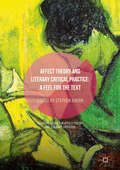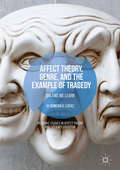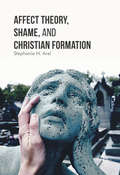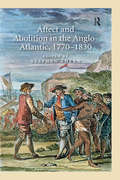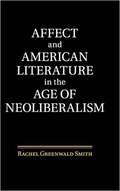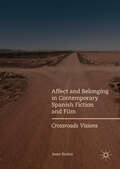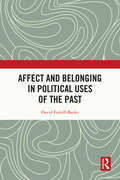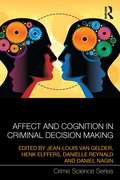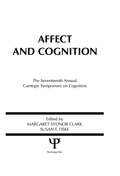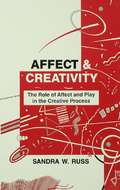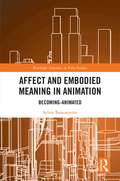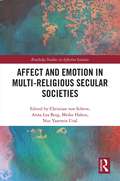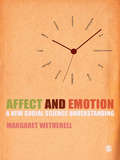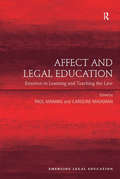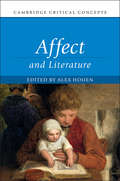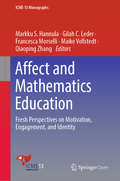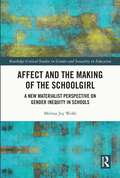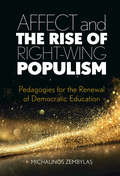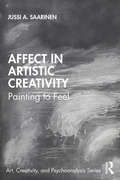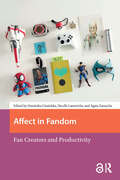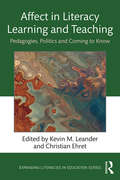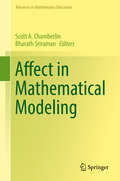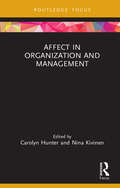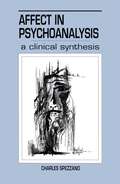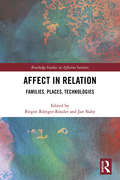- Table View
- List View
Affect Theory and Literary Critical Practice: A Feel for the Text (Palgrave Studies in Affect Theory and Literary Criticism)
by Stephen AhernAffect Theory and Literary Critical Practice develops new approaches to reading literature that are informed by the insights of scholars working in affect studies across many disciplines, with essays that consider works of fiction, drama, poetry and memoir ranging from the medieval to the postmodern. While building readings of representative texts, contributors reflect on the value of affect theory to literary critical practice, asking: what explanatory power is affect theory affording me here as a critic? what can the insights of the theory help me do with a text? Contributors work to incorporate lines of theory not always read together, accounting for the affective intensities that circulate through texts and readers and tracing the operations of affectively charged social scripts. Drawing variously on queer, feminist and critical race theory and informed by ecocritical and new materialist sensibilities, essays in the volume share a critical practice founded in an ethics of relation and contribute to an emerging postcritical moment.
Affect Theory, Genre, and the Example of Tragedy: Dreams We Learn (Palgrave Studies in Affect Theory and Literary Criticism)
by Duncan A. LucasAffect Theory, Genre, and the Example of Tragedy employs Silvan Tomkins’ Affect-Script theory of human psychology to explore the largely unacknowledged emotions of disgust and shame in tragedy. The book begins with an overview of Tomkins’ relationship to both traditional psychoanalysis and theories of human motivation and emotion, before considering tragedy via case studies of Oedipus, Hamlet, and Death of a Salesman. Aligning Affect-Script theory with literary genre studies, this text explores what motivates fictional characters within the closed conditions of their imagined worlds and how we as an audience relate to and understand fictional characters as motivated humans.
Affect Theory, Shame, and Christian Formation
by Stephanie N. ArelThis book addresses the eclipse of shame in Christian theology by showing how shame emerges in Christian texts and practice in ways that can be neither assimilated into a discourses of guilt nor dissociated from embodiment. Stephanie N. Arel argues that the traditional focus on guilt obscures shame by perpetuating the image of the lonely sinner in guilt. Drawing on recent studies in affect and attachment theories to frame the theological analysis, the text examines the theological anthropological writings of Augustine and Reinhold Niebuhr, the interpretation of empathy by Edith Stein, and moments of touch in Christian praxis. Bringing the affective dynamics of shame to the forefront enables theologians and religious leaders to identify where shame emerges in language and human behavior. The text expands work in trauma theory, providing a multi-layered theological lens for engaging shame and accompanying suffering.
Affect and Abolition in the Anglo-Atlantic, 1770–1830
by Stephen AhernAt the turn of the nineteenth century, writers arguing for the abolition of the slave trade and the emancipation of those in bondage used the language of sentiment and the political ideals of the Enlightenment to make their case. This collection investigates the rhetorical features and political complexities of the culture of sentimentality as it grappled with the material realities of transatlantic slavery. Are the politics of sentimental representation progressive or conservative? What dynamics are in play at the site of suffering? What is the relationship of the spectator to the spectacle of the body in pain? The contributors take up these and related questions in essays that examine poetry, plays, petitions, treatises and life-writing that engaged with contemporary debates about abolition.
Affect and American Literature in the Age of Neoliberalism
by Rachel Greenwald SmithRachel Greenwald Smith's Affect and American Literature in the Age of Neoliberalism examines the relationship between American literature and politics in the twentieth- and twenty-first centuries. Smith contends that the representation of emotions in contemporary fiction emphasizes the personal lives of characters at a time when there is an unprecedented, and often damaging, focus on the individual in American life. Through readings of works by Paul Auster, Karen Tei Yamashita, Ben Marcus, Lydia Millet, and others who stage experiments in the relationship between feeling and form, Smith argues for the centrality of a counter-tradition in contemporary literature concerned with impersonal feelings: feelings that challenge the neoliberal notion that emotions are the property of the self.
Affect and Belonging in Contemporary Spanish Fiction and Film: Crossroads Visions
by Jesse BarkerThis book brings together recent Spanish fictions and films that point to individualism as the root problem driving diverse circumstances of social, economic, and psychological suffering in the present and recent past. The works privilege sensation, movement, and emotion--rather than identity--as the core elements of existential experience. However, the works also problematize notions of intersubjectivity, confronting ideals of affective immersion and cultural nomadism with the concrete contexts that shape particular lives and social formations. This confrontation underlies a series of 'crossroads', or productive engagements, that guide the book's five main chapters: locally rooted identity and global cultural circuits; historical contexts and universal modes of being; personal authenticity and consumer culture; migration and cultural identity; Spain's historical underdevelopment and impending future crises. All of these issues make affective connection and attachment the greatest existential challenge facing individuals and collectives in the contemporary world, both in Spain and elsewhere.
Affect and Belonging in Political Uses of the Past
by David Farrell-BanksAffect and Belonging in Political Uses of the Past examines key political events of the past decade, to analyse the relationship between the representation of certain pasts in ‘official’ heritage settings and the use of the same pasts in political discourse. Drawing on data gathered from museums, heritage sites, news articles, political speeches, manifestos, and through digital media such as Twitter, Farrell-Banks demonstrates how a connection with a shared past can move people emotionally and give them the confidence to engage in political action. The book considers how heritage and the past moves in time and space, examining how it shapes political beliefs and action in the present. The work is a timely intervention, calling attention to the political responsibilities that come with heritage work, when these same languages of heritage are adopted to promote a politics of division. Introducing the concept of the ‘moving moment’, a framework by which to research and understand uses of the past, the book demonstrates how the past becomes a potent political tool. Combining critical heritage studies, critical discourse, memory studies and political theory, the book demonstrates new approaches to interdisciplinary studies within heritage. Affect and Belonging in Political Uses of the Past will thus be essential reading for academics and students engaged in the study of heritage, memory, politics, history and media.
Affect and Cognition in Criminal Decision Making: Between Rational Choices And Lapses Of Self-control (Crime Science Series)
by Danielle Reynald Jean-Louis Van Gelder Henk Elffers Daniel NaginResearch and theorizing on criminal decision making has not kept pace with recent developments in other fields of human decision making. Whereas criminal decision making theory is still largely dominated by cognitive approaches such as rational choice-based models, psychologists, behavioral economists and neuroscientists have found affect (i.e., emotions, moods) and visceral factors such as sexual arousal and drug craving, to play a fundamental role in human decision processes. This book examines alternative approaches to incorporating affect into criminal decision making and testing its influence on such decisions. In so doing it generalizes extant cognitive theories of criminal decision making by incorporating affect into the decision process. In two conceptual and ten empirical chapters it is carefully argued how affect influences criminal decisions alongside rational and cognitive considerations. The empirical studies use a wide variety of methods ranging from interviews and observations to experimental approaches and questionnaires, and treat crimes as diverse as street robbery, pilfering, and sex offences. It will be of interest to criminologists, social psychologists, judgment and decision making researchers, behavioral economists and sociologists alike.
Affect and Cognition: 17th Annual Carnegie Mellon Symposium on Cognition (Carnegie Mellon Symposia on Cognition Series)
by Susan T. Fiske Margaret Sydnor ClarkFirst published in 1982. Routledge is an imprint of Taylor & Francis, an informa company.
Affect and Creativity: the Role of Affect and Play in the Creative Process (Personality Assessment Series)
by Sandra Walker RussMuch work has been done on cognitive processes and creativity, but there is another half to the picture of creativity -- the affect half. This book addresses that other half by synthesizing the information that exists about affect and creativity and presenting a new model of the role of affect in the creative process. Current information comes from disparate literatures, research traditions, and theoretical approaches. There is a need in the field for a comprehensive framework for understanding and investigating the role of affect in creativity. The model presented here spells out connections between specific affective and cognitive processes important in creativity, and personality traits associated with creativity. Identifying common findings and themes in a variety of research studies and descriptions of the creative process, this book integrates child and adult research and the classic psychoanalytic approach to creativity with contemporary social and cognitive psychology. In so doing, it addresses two major questions: * Is affect an important part of the creative process? * If it is, then how is affect involved in creative thinking? In addition, Russ presents her own research program in the area of affect and creativity, and introduces The Affect in Play Scale -- a method of measuring affective expression in children's play -- which can be useful in child psychotherapy and creativity research. Current issues in the creativity area are also discussed, such as artistic versus scientific creativity, adjustment and the creative process, the role of computers in learning about creativity, gender differences in the creative process, and enhancing creativity in home, school, and work settings. Finally, Russ points to future research issues and directions, and discusses alternative research paradigms such as mood-induction methods versus children's play procedures.
Affect and Embodied Meaning in Animation: Becoming-Animated (Routledge Advances in Film Studies)
by Sylvie BissonnetteThis book combines insights from the humanities and modern neuroscience to explore the contribution of affect and embodiment on meaning-making in case studies from animation, video games, and virtual worlds. As we interact more and more with animated characters and avatars in everyday media consumption, it has become vital to investigate the ways that animated environments influence our perception of the liberal humanist subject. This book is the first to apply recent research on the application of the embodied mind thesis to our understanding of embodied engagement with nonhumans and cyborgs in animated media, analyzing works by Émile Cohl, Hayao Miyazaki, Tim Burton, Norman McLaren, the Quay Brothers, Pixar, and many others. Drawing on the breakthroughs of modern brain science to argue that animated media broadens the viewer’s perceptual reach, this title offers a welcome contribution to the growing literature at the intersection of cognitive studies and film studies, with a perspective on animation that is new and original. ‘Affect and Embodied Meaning in Animation’ will be essential reading for researchers of Animation Studies, Film and Media Theory, Posthumanism, Video Games, and Digital Culture, and will provide a key insight into animation for both undergraduate and graduate students. Because of the increasing importance of visual effect cinema and video games, the book will also be of keen interest within Film Studies and Media Studies, as well as to general readers interested in scholarship in animated media.
Affect and Emotion in Multi-Religious Secular Societies (Routledge Studies in Affective Societies)
by Christian Von Scheve Anna Lea Berg Meike Haken Nur Yasemin UralEmotions have moved center stage in many contemporary debates over religious diversity and multicultural recognition. As in other contested fields, emotions are often one-sidedly discussed as quintessentially subjective and individual phenomena, neglecting their social and cultural constitution. Moreover, emotionality in these debates is frequently attributed to the religious subject alone, disregarding the affective anatomy of the secular. This volume addresses these shortcomings, bringing into conversation a variety of disciplinary perspectives on religious and secular affect and emotion. The volume emphasizes two analytical perspectives: on the one hand, chapters take an immanent perspective, focusing on subjective feelings and emotions in relation to the religious and the secular. On the other hand, chapters take a relational perspective, looking at the role of affect and emotion in how the religious and the secular constitute one another. These perspectives cut across the three main parts of the volume: the first one addressing historical intertwinements of religion and emotion, the second part emphasizing affects, emotions, and religiosity, and the third part looking at specific sensibilities of the secular. The thirteen chapters provide a well-balanced composition of theoretical, methodological, and empirical approaches to these areas of inquiry, discussing both historical and contemporary cases.
Affect and Emotion: A New Social Science Understanding
by Prof Margaret WetherellIn recent years there has been a huge surge of interest in affect and emotion. Scholars want to discover how people are moved, and understand embodied social action, feelings and passions. How do social formations 'grab' people? How do roller coasters of contempt, patriotism, hate and euphoria power public life? <P> A new social science understanding of affect and emotion is long overdue and Margaret Wetherell's voice is timely, providing a coherent and pragmatic text. It will be invaluable reading for those interested in this fascinating field across the social and behavioural sciences.
Affect and Legal Education: Emotion in Learning and Teaching the Law (Emerging Legal Education)
by Caroline Maughan Paul MahargThe place of emotion in legal education is rarely discussed or analysed, and we do not have to seek far for the reasons. The difficulty of interdisciplinary research, the technicisation of legal education itself, the view that affect is irrational and antithetical to core western ideals of rationality - all this has made the subject of emotion in legal education invisible. Yet the educational literature on emotion proves how essential it is to student learning and to the professional lives of teachers. This text, the first full-length book study of the subject, seeks to make emotion a central topic of research for legal educators, and restore the power of emotion in our teaching and learning. Part 1 focuses on the contribution that neuroscience can make to legal learning, a theme that is carried through other chapters in the book. Part 2 explores the role of emotion in the working lives of academics and clinical staff, while Part 3 analyses the ways in which emotion can be used in learning and teaching. The book, interdisciplinary and wide-ranging in its reference, breaks new ground in its analysis of the educational lifeworld of situations, communities, actors and interactions in legal education.
Affect and Literature (Cambridge Critical Concepts)
by Alex HouenThis book considers how 'affect', the experience of feeling or emotion, has developed as a critical concept within literary studies in different periods and through a range of approaches. Stretching from the classical to the contemporary, the first section of the book, 'Origins', considers the importance of particular areas of philosophy, theory, and criticism that have been important for conceptualizing affect and its relation to literature. Includes ancient Greek and Roman philosophy, eighteenth-century aesthetics, Marxist theory, psychoanalysis, queer theory, and postcolonial theory. The chapters of the second section, 'Developments', correspond to those of the previous section and build on their insights through readings of particular texts. The final 'Applications' section is focused on contemporary and future lines of enquiry, and revolves around a particular set of concerns: media and communications, capitalism, and an environment of affective relations that extend to ecology, social crisis, and war.
Affect and Mathematics Education: Fresh Perspectives on Motivation, Engagement, and Identity (ICME-13 Monographs)
by Markku S. Hannula Qiaoping Zhang Francesca Morselli Gilah C. Leder Maike VollstedtThis open access book, inspired by the ICME 13 topic study group “Affect, beliefs and identity in mathematics education”, presents the latest trends in research in the area. Following an introduction and a survey chapter providing a concise overview of the state-of-art in the field of mathematics-related affect, the book is divided into three main sections: motivation and values, engagement, and identity in mathematics education. Each section comprises several independent chapters based on original research, as well as a reflective commentary by an expert in the area. Collectively, the chapters present a rich methodological spectrum, from narrative analysis to structural equation modelling. In the final chapter, the editors look ahead to future directions in the area of mathematics-education-related affect.It is a timely resource for all those interested in the interaction between affect and mathematics education.
Affect and the Making of the Schoolgirl: A New Materialist Perspective on Gender Inequity in Schools (Routledge Critical Studies in Gender and Sexuality in Education)
by Melissa Joy WolfeBy exploring the material-discursive production of gender norms in Australian secondary schools, this book offers a novel feminist posthuman new materialist perspective on how schoolgirls are pre-determined within educational space and place. The text ultimately illustrates how gender and race inequity is reproduced through presumptive thinking and a failure to recognize student potential. Affect and the Making of the Schoolgirl maps affective accounts of students’ everyday experiences in school spaces. Student negotiations with prescriptive processes of subject participation and subject selection are explored to illustrate how inequities are systematically reproduced. Chapters also offer an examination of STEM subject fields as entitled male space. Engaging theoretically with concepts from performative feminist new materialism and affect theory, the text highlights filmic semblances created as part of an onto-epistemological project, and calls for alternative educational encounters which affirmatively acknowledge difference and promote non-binary thinking. This text will benefit postgraduate researchers, academics, and scholars with an interest in gender and sexuality education, teacher education, STEM education, gender inequality, intersectionality, and the sociology of education. Those interested in gender studies, affect theory and feminist theory, as well as educational policy and politics more broadly will also benefit from this book.
Affect and the Rise of Right-Wing Populism: Pedagogies for the Renewal of Democratic Education
by Michalinos ZembylasThis book uses affect theory to analyze the rise of right-wing populism in recent years and discusses the pedagogical implications for democratic education. It provides examples of how affect and emotion play a crucial role in the rise and reproduction of current right-wing populism. The author suggests ideas about affective pedagogies for educators to use (along with recognizing the risks involved) to renew democratic education. The chapters lay out the importance of harnessing the power of affective experiences and adopting strategic pedagogical approaches to provide affirmative practices that move beyond simply criticizing right-wing populism. The book consequently undermines the power of fascist and right-wing tendencies in public life and educational settings without stooping to methods of indoctrination. This volume is a valuable resource for researchers and policy-makers in education, political science and other related fields, who can utilize the affective complexities involved in combatting right-wing populism to their advantage.
Affect in Artistic Creativity: Painting to Feel (Art, Creativity, and Psychoanalysis Book Series)
by Jussi SaarinenWhy do painters paint? Obviously, there are numerous possible reasons. They paint to create images for others’ enjoyment, to solve visual problems, to convey ideas, and to contribute to a rich artistic tradition. This book argues that there is yet another, crucially important but often overlooked reason. Painters paint to feel. They paint because it enables them to experience special feelings, such as being absorbed in creative play and connected to something vitally significant. Painting may even transform the painter’s whole sense of being. Thus, painting is not only about producing art, communicating content, and so on, but also about setting up and inhabiting an experiential space wherein highly valued feelings are interactively enabled and supported. This book investigates how and why this happens by combining psychoanalytical theorization on creativity with philosophical thinking on affectivity. It focuses on creative experience itself, and illuminates the psychological mechanisms and dynamics that underlie the affects at stake. Painters’ own descriptions of how they feel at work are used throughout to give an accurate, true-to-life portrayal of the experience of painting. The strength of the book lies in its open-minded yet critical integration of contemporary psychoanalytic and philosophical thinking, and in its truthfulness to painters’ experiential descriptions of the painterly process. On the whole, it enriches our understanding of artistic creativity and sheds more light on how and why we come to feel the things we do. As such, the book will appeal to philosophers, psychoanalysts, and art researchers alike.
Affect in Fandom: Fan Creators and Productivity (Transmedia)
by Dominika Ciesielska Nicolle Lamerichs Agata ZarzyckaThis book provides a timely discussion of the creative practices in fandom and media culture. Within their participatory cultures, fans produce a wealth of content, data and materials. They write fan fiction, curate wikis and design costumes. This international collection offers a diverse exploration of contemporary fan practices through different cases, such as Yuri!!! On ICE, Harry Potter and Mass Effect., This book reveals how expression, emotion and agency are central to fan activity. Fans are highly adept at transmedia, as well as the critical use of different media and platforms. Fandom can apply to wider concepts within new media, the humanities and design, as the authors in this collection show. They also rely on different approaches, ranging from textual analysis to different forms of ethnography. Overall, Affect in Fandom offers a deliberately diverse exploration of exactly what contemporary fans create and curate, and how.
Affect in Literacy Learning and Teaching: Pedagogies, Politics and Coming to Know (Expanding Literacies in Education)
by Kevin M. Leander Christian EhretIn this cutting-edge volume, scholars from around the world connect affect theory to the field of literacy studies and unpack the role and influence of this emerging area of scholarship on literacy education. Offering an introduction to affect theory and scholarship as it relates to literacy studies, contributors discuss the role of humanizing and dehumanizing influences on schooling and examine the emotional and affective dimensions at individual and communal levels. Arguing that an affective turn requires a radical rethinking of the nature of literacy, these chapters address the impact and import of emotion and affect on reading, writing and calling to action. Grounded in trailblazing research, the contributors push the boundaries of academic writing and model how theoretically-driven writing about affect must itself be moving and expressive.
Affect in Mathematical Modeling (Advances in Mathematics Education)
by Bharath Sriraman Scott A. ChamberlinIn the book, the relationship between affect and modeling is discussed because, as educational psychologists have suggested for decades, affect directly influences achievement. Moreover, given the importance of mathematical modeling and the applications to high level mathematics, it provides the field of mathematics psychology with insight regarding affect, in relation to mathematical modeling. By doing so it helps determine the degree to which understanding of mathematics and understanding affect in mathematical modeling episodes may have a direct effect on cognition.
Affect in Organization and Management (Routledge Focus on Women Writers in Organization Studies)
by Carolyn Hunter Nina KivinenAffect in Organization and Management asks how affect theory understands everyday working lives through embodied, social and political practice. Discussing a range of dimensions and perspectives on affect, the book considers how subjects are formed through their connections with others, both human and non- or more-than-human. The six women writers on affect presented in this series (Sara Ahmed, Kathleen Stewart, Donna Haraway, Jane Bennett, Karen Barad and Rosalyn Diprose) all speak to important themes in organization studies, including power, politics and ethics. Each chapter explores how these thinkers have already influenced organization scholars, as well as how their work can extend our understanding of pressing organizational issues around gender, race, the environment, leadership and ethics. Feminism is a core feature of this collection, highlighting feminist writing with affective, connected and intersubjective possibilities. Each woman writer is introduced by experts on affect and organization studies. The chapters also suggest further reading and accessible resources. The book is suitable for students, academics and practitioners in business and management, organization studies and critical management studies who want to think differently about organizations.
Affect in Psychoanalysis: A Clinical Synthesis (Relational Perspectives Book Series)
by Charles SpezzanoDrawing on the writings of Freud, Fairbairn, Klein, Sullivan, and Winnicott, Spezzano offers a radical redefinition of the analytic process as the intersubjective elaboration and regulation of affect. The plight of analytic patients, he holds, is imprisonment within crude fantasy elaborations of developmentally significant feeling states. Analytic treatment fosters the patient's capacity to keep alive in consciousness, and hence reflect on, these previously warded-off affective states; it thereby provides a second chance to achieve competence in using feeling states to understand the self within its relational landscape.
Affect in Relation: Families, Places, Technologies (Routledge Studies in Affective Societies)
by Birgitt Röttger-Rössler Jan SlabyDecades of research on affect and emotion have brought out the paramount importance of affective processes for human lives. Affect in Relation brings together perspectives from social science and cultural studies to analyze the formative, subject constituting potentials of affect and emotion. Relational affect is understood not as individual mental states, but as social-relational processes that are both formative and transformative of human subjects. This volume explores relational affect through a combination of interdisciplinary case studies within four key contexts: Part I: “Affective Families” deals with the affective dynamics in transnational families who are scattered across several regions and nations. Part II: “Affect and Place” brings together work on affective place-making in the contexts of migration and in political movements. Part III: “Affect at Work” analyzes the affective dimension of contemporary white-collar workplaces. Part IV: “Affect and Media” focuses on the role of media in the formation and mobilization of relational affect. In its transdisciplinary spirit, analytical rigor and focus on timely and salient global matters, Affect in Relation consolidates the field of affect studies and opens up new avenues for scholarly and practical co-operation. It will appeal to both students and postdoctoral researchers interested in fields such as anthropology, sociology, cultural studies, media studies and human development.
